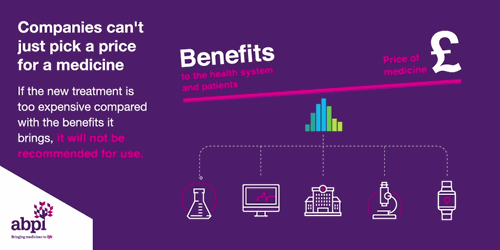Medicine pricing
The UK has robust measures in place to ensure that medicines and vaccines are both clinically and cost effective before they can be used in the NHS.
Pharmaceutical companies can’t pick whatever price they like, they have to think very carefully about how much value that medicine is offering patients, and society, and the NHS is a very strong customer in this country to negotiate with pharmaceutical companies.
The National Institute of Health and Care Excellence looks very carefully at the clinical data around how well a medicine works, and looks at the price and works out if the price being charged by the company is worth it for the benefits that it brings patients and the health system.
NICE is widely respected around the world as one of the most rigorous institutions that scrutinises the value for money of medicines prices and so when NICE does approve a medicine in the NHS can have a lot of confidence that it represents very good value for money.
How are medicines priced?
Picking the price of a medicine
When setting the price of an individual medicine, companies will consider a number of factors including how well the medicine treats patients, how many patients might benefit from it, the value that health systems might place on a medicine in the disease area in question and the price of competing products.
There are a number of ways in which medicines costs are managed, with the UK regarded as having one of the world’s most rigorous systems.

The role of NICE – the National Institute for Health and Care Excellence
NICE – the National Institute for Health and Care Excellence - is the body which advises the NHS on whether a new medicine is cost effective; It does this by comparing how much it costs to give a patient an extra year of ‘quality life’ compared with the treatment already being used.
If the new treatment is deemed to be too expensive compared with the benefits it brings it is not recommended for use.
Companies need to take into account the costs of research and development – not just for the successful medicine but also for the many which have failed.
Our industry constantly works with NICE to make sure that their assessments remain fit for purpose across all disease areas to ensure transparency, clarity and fairness for all patients throughout the UK.
We want to make sure that patients in Scotland can continue to access the latest new medicines. It is not only about protecting the checks and balances we have in place today but making sure Scotland is ready for the future.
There’s more that can be done to speed up R&D of new medicines: including making the most of the health data that’s collected by NHS Scotland. If we are serious about greater efficiency, then it is important to use the data we have.
We’re proud to be delivering for the health and the economy of Scotland. The pharmaceutical industry delivers £2.7 billion into the Scottish economy – that equates to 5,000 jobs which go on to support thousands more in the communities the length and breadth of Scotland.
Last modified: 23 May 2024
Last reviewed: 23 May 2024